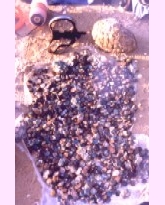
Hellenistic Hoard of Silver Ptolemy Coins
The cargo of a Hellenistic shipwreck was discovered off the Megadim coast, some 6 km south of Haifa, in 1968 by divers from the AURI. The site was located again in 1980 and excavated by a team of the MAU under the direction of E. Galili, S. Wacshmann and K. Raveh. The vessel, which was apparently from the Hellenistic period, bore a cargo that included bronze and silver coins of the Ptolemaic, and Seleucid dynasties (2nd century BC), bronze nails and fittings, broken bronze anthropomorphic and zoomorphic figurines and life-size anthropomorphic statuary fragments. In addition, the ship carried a wine amphora in secondary use that held tens of kg of metal objects, including decorated bracelets, gold-plated diadems, arrow heads, metal-smith’s tools, nails, architectural clamps, arch handles of small vessels, tacks for fixing lead sheathing, gilded decorating tucks, a gilded stem and leaves of a wreath, copper ingots and other metal fittings and jewelry. The character of the finds, the tools found at the site, and the unfinished jewelry items suggest that one of the vessel’s passengers was a jeweler metal-smith with a portable workshop or was a scrap-metal dealer. The pieces of large bronze statuary were probably intended for recycling.
Two additional Hellenistic assemblages (type C2) were recovered from the Kfar-Samir region south of Haifa. The finds included a hoard of thousands of Ptolemaic silver coins dated to the 2nd century BC, lead fastenings of stone anchors, sounding leads, bronze fittings shaped like lion’s heads, bronze nails and sections of lead sheathing from the vessel’s hull.